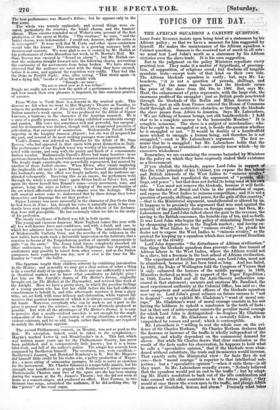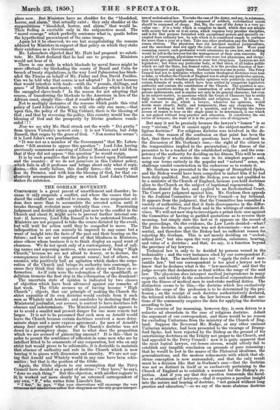TOPICS OF THE DAY.
TILE AFRICAN SQUADRON A CABINET QUESTION.
Than JOHN RUSSELL insists upon being tried as a statesman by his African policy ; so that we have a measure for him suggested by
himself. He makes the maintenance of the African squadron a Cabinet question. Success is the received test of merit in all arts : we must test Lord John's merit as a statesman by his African victories over the slave-trade. It is his own suggestion.
But in the judgment on the policy Ministers repudiate every practical teat. They make it a matter of hypothesis, of presump- tion, of supposition, of religious creed; but disclaim all tangible mundane tests—except tests of that kind on their own side. The African blockade squadron is costly; but, says Mr. La- bouchere, " it is not a question of pounds, shillings, and pence." Yet the same man boasts that the blockade raises the price of the slave from 261. 10s. to 1001. But, says Mr. Hutt, the enhancement of price represents, with the large risk, the enormous profits of the smuggler : just as British goods penetrated through the blockade of the Berlin and Milan decrees to the Tuileries, just as silk from France entered the House of Commons itself through all our restrictive obstacles, so through the blockade the slave passes from Africa to America. Says Mr. Labouchere, " We are talking of human beings, not silk handkerchiefs : I hold that to be a complete answer to the honourable Member." It is complete nonsense. The slave is a subject of merchandise ; whe- ther he ought to be smuggled or not, is beside the question whether he is smuggled or not. " It would be doubly or a hundredfold more wicked to smuggle a human being, and therefore he is not smuggled,"—such is -Mr. Labouchere's argument. The fact re- mains that he is smuggled : but Mr. Labouchere holds that the fact is disproved, or neutralized—we scarcely know which—by its excessive wickedness !
Remember, we are examining the reasons hazarded by Ministers for the policy on which they have expressly staked their existence as a Government.
If you abolish the blockade, argues Lord John in support of this the vital principle of his Cabinet, you expose the free labour and British interests of the West Indies to "ruinous rivalry." Mr. Labouchere had repudiated the argument of " pounds, shil- lings, and pence " ; but that does not forbid its being used on his own side. " You must not remove the blockade, because it will facili- tate the industry of Brazil and Cuba in the production of sugar, and expose the West Indies to ruinous competition ; and it is not a question of pounds, shillings, and pence, for the gain of this country," —that is the Ministerial argument, unadulterated or altered by us, It happens to be precisely the argument that was used against the removal of the prohibitory duties on foreign sugar : but then, Mr. Labouchere and Lord John talked about the gain to the revenue, the saving to the British consumer, the humble cup of tea, and so forth. It was Lord John who began the policy of stimulating Brazil trade by cheapening its produce in the English market ; and having ex- posed the West Indies to that " ruinous rivalry," he pleads his desire not to expose the West Indies to "ruinous rivalry," as the pretext for keeping up a squadron which does not prevent Brazilian industry or the rivalry.
Lord John deprecates "the disturbance of African civilization." One thing the blockade squadron does prevent—the free transit of African labour to the West Indies, where the African would not be a slave, but a freeman in the best school of African civilization.
The experiment of forcible prevention, says Lord John, must not be abandoned, because it has been tried so long. And has failed. In 1822, the Duke of Wellington told the Congress of Vienna that it only enhanced the horrors of the middle passage ; in 1839, Ministers declared as much, in support of the Niger Expedition ; in 1840, Exeter Hall and all the Anti-Slavery authorities con- curred in that statement ; accurate and cautious Mr. Bandinel, the most experienced authority at the Colonial Office, has said so ; the most competent and accredited officers of the blockade squadron now say so. Lord John's great reliance on future success is " not to despond "—not to exhibit Mr. Gladstone's "want of moral cou- rage." Mr. Gladstone's want of moral courage consists in his not having the boldness to uphold a conclusion m the teeth of facts-: but in that sort of achievement consists the peculiar moral courage for which Lord John is distinguished—he despises Mr. Gladstone for the want of it. Mr. Gladstone is a cowardly fellow, who is vanquished by reason anarnoof; which is contemptible. Mr. Labouchere is " • to rest the whole case on the evi- dence of Sir Charles Hotham. Sir Charles liotham declares that the decrease or increase of the traffic is wholly independent of the squadron, and wholly dependent on the commercial demand for slaves. But while Sir Charles draws that clear conclusion as the result of the facts under his observation, he happens to hold what he calls a " speculative opinion," that if the blockade were aban- doned without substitute, the trade and its miseries would increase. That exactly suits the Ministerial view : for facts they do not care----their moral courage " is superior to that intellectual sub- jection ; but a " speculative opinion "—when it suits them—is all they want. So Mr. Labouchere roundly avows, " Nobody believed that the squadron would put an end to the traffic ; but by adopt- ing Mr. Hutt's resolution to back out of the idle combination and take counsel with other countries as to the future policy, " they would at once throw the o3ean open to the traffic, and plunge Afriea in scenes of bloodshed, horror, and alarm." Precisely what takes
place now. But Ministers have no shudder for the "bloodshed, horror, and alarm," that actually exist ; they only shudder at the supposititious " bloodshed, horror, and alarm," that would be. Their feeling is excitable only in the subjunctive mood. The " moral courage " which perfectly contemns what is, quails before the hypothetical presentment of the same image. Again let it be observed, we are but recapitulating the reasons adduced by Ministers in support of that policy on which they stake their existence as a Government.
Mr. Labouchere objected that Mr. Hutt had proposed no substi- tirte. Mr. Hutt declared that he had one to propose. Ministers would not hear of it.
There is one mode in which blockade by naval forces might be more effectual—by blockaaing the coasts of Brazil and Cuba for breach of treaty stipulations, in the way Lord Palmerston has block- aded the Piraeus on behalf of Mr. Finlay and Don David Pacifico. Can we be told why that course is not adopted? Is it not because that would interfere with trade—with the " pounds, shillings, and pence " of British merchants ; with the industry which is fed by the smuggled slave-trade ? Is the reason for not adopting that course, of transferring the blockade to the American in lieu of the African coast, simply this—that it would be effectual f Not to multiply instances of the reasons which guide this vital policy of Lord Join's Cabinet, we will cite only one more,—that upon this, the policy of the Whig Cabinet, there is the blessing of God ; and that by reversing the policy, this country would lose the blessing of God and the prosperity by Divine goodness vouch- safed ! ! !
Now we see why Mr. Shell struck out the words " Dei gratia " from Queen Victoria's newest coin : it is not Victoria, but John Russell, that reigns by the grace of God. "Non noster hie sermo "; it is Lord John's own proclamation. "It was not as a member of the Government" that Mr. Labon- chere "felt anxious to oppose this question": Lord john having previously summoned a meeting of Liberal Members and told them that if they did not oppose "this question" he would resign. It is by such penalties that the policy is forced upon Parliament and the country : if we do not persevere in this Cabinet policy,
ihich fails in all it professes and brings about only what it repu- 'ates,—this costly failure, this deadly farce,—the country will se its Premier, and with him the blessing of God, for that ex- .01usively accompanies the policy on which Lord John's Cabinet Makes its existence.



























 Previous page
Previous page